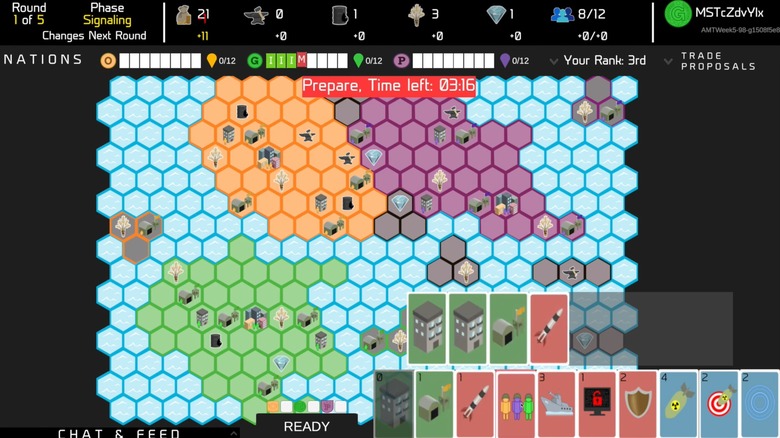The Video Game That Could Help Scientists Understand Nuclear War
For the past several decades, the threat of nuclear war has hung above our heads like a crashed airplane in the canopy of a jungle. We have no idea when it'll fall or what'll happen when it does. All we know is that it's up there, it's dangerous, and we'll never truly feel at ease as long as that's the case.
That hasn't stopped some from trying to game out what a nuclear war might look like, however. And in this instance, the term "game" is the most appropriate one. Researchers from several prestigious universities and laboratories have come together to form what's called the Project for Nuclear Gaming, and at the center of that project lies a strategy game called SIGNAL, which stands for Strategic Interaction Game between Nuclear Armed Lands.
SIGNAL, according to VICE, is an online strategy game for three players that puts each one in charge of an unnamed country. The object of the game is not unlike that of Civilization or Rise of Nations, in that players are encouraged to build out their countries, take control of resources, and defend themselves from other players if necessary. As you can see in the screenshot above, the game is played on a rectangular board, of sorts, with each country's territory represented by the hexagons it controls.
Should players want to take action in any way — whether they're building something or dropping a nuclear bomb — they must first "signal" to the other players which hexagon they're about to make a move on. And that where the "gaming out" of a potential nuclear war hopefully starts for those who are running SIGNAL and the project at large. After one player signals, all players can chat, trade, and perhaps do what they can to prevent an aggressive player from deploying nukes, which in turn could prevent an all-nuclear war from erupting.
But should that war occur (in the game), SIGNAL will have at least given researchers a look into what led to such a catastrophe unfolding.
SIGNAL doesn't come across as the most effective way to study this topic by any stretch; it's just a game, after all, and the decision to drop a nuke in a video game is nowhere close to being as weighty there as it would be in real life. But it's still an attempt to understand what kind of decisions and thought processes might contribute to such an event. In that regard, it's a good thing.
Hopefully we never get a chance to see how a few rounds of SIGNAL compare to the real thing.

